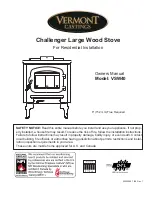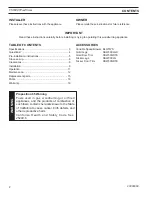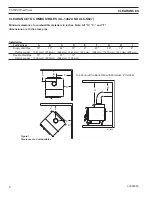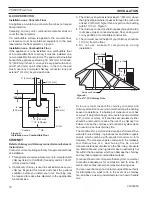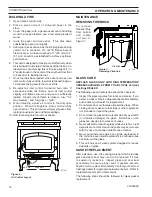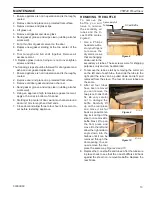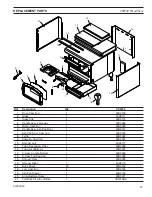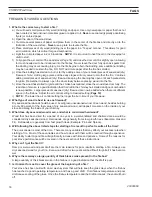
VSW40 Wood Stove
4
20300060
QUESTIONS?
NEEd TO ASk QUESTIONS? REQUIRE PARTS INFORMATION?
First, contact the Vermont Castings Dealer from whom you purchased your stove, for parts and service.
Have the following information ready:
•
Date of purchase
•
Serial number (from the back of your stove)
•
Model number (from the back of your stove)
•
Dealer name and phone
If you still need assistance, contact Vermont Castings technical support (below).
WONdERING ABOUT ThE WARRANTY?
See the last page of this manual for general warranty information. For additional information, contact your
Vermont Castings dealer or Vermont Castings Parts and warranty.
Vermont Castings
Technical Service, Parts & Warranty
Phone: 877-406-9180
Fax: 877-406-5647
Model and product serial numbers can be found on the certification label of your stove.
BEFORE INSTALLATION OF YOUR APPLI-
ANCE
1. Check with the building inspector’s office for compliance
with local codes; a permit may be required.
2. This appliance requires a masonry or prefabricated
chimney listed to ULC S629 (Canada) and UL 103HT
(U.S.) sized correctly.
3. A 6" (152 mm) diameter flue is required for proper
performance.
4. Always connect this unit to a chimney and
NEVER
VENT
TO ANOTHER ROOM OR INSIDE A BUILDING.
5. dO NOT
connect this unit to any duct work to which
another appliance is connected such as a furnace.
6. dO NOT
connect this unit to a chimney flue serving
another appliance.
7.
The connector pipe and chimney should be inspected
periodically and cleaned if nescessary.
8. Remember the clearance distances when you place
furniture or other objects within the area.
dO NOT
store
wood, flammable liquids or other combustible materials
too close to the unit.
Refer to certification label on
back of your unit for required clearances.
9. Contact your local municipal or provincial fire authority
for information on how to handle a chimney fire. Have
a clearly understood plan to handle a chimney fire. In
the event of a chimney fire, turn air control to closed
position and
CALL ThE FIRE dEPARTMENT.
10. dO NOT
tamper with combustion air control beyond
normal adjustment.
11. If installing in a mobile home, use mobile home kit.
WhY ThE CORRECT FLUE SIZE IS IMPOR-
TANT
— 6" (152 mm)
Draft is the force, which moves air from the appliance up
through the chimney. The amount of draft in your chimney
depends on the length of the chimney, local geography,
nearby obstructions, and other factors. Too much draft
may cause excessive temperatures in the appliance. An
uncontrolled burn, a glowing red part or chimney connector
indicates excessive draft. Inadequate draft may cause back
puffing into the room and “plugging” of the chimney and/or
cause the appliance to leak smoke into the room through
appliance and chimney connector joints.
Today’s solid fuel appliances are much more efficient than
in the past. The units are designed to give you controlled
combustion, as well as maximum heat transfer, using less
fuel to do so. The design of your new appliance is such that
the exhaust “smoke” is now at lower temperatures than in
the past, therefore requiring proper chimney size to give
adequate draft. If your chimney is too large, the heating
appliance will have a difficult time to raise the “chimney
flue” temperature to give adequate draft, therefore causing
a smoke back up, poor burn, or both.
Should you experience such a problem call in a local
chimney expert.
With the door closed, the rate of burning is regulated by
the amount of air allowed to enter the unit through the air
control. With experience you will be able to set the control
for heat and burning time desired.
Once the required chimney draft is obtained, operate only
with doors closed and open slowly when re-fueling. (This
will reduce or eliminate smoke from entering the room.)

